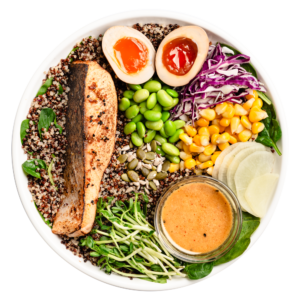Our Hail Caesar Salad transforms the traditional Caesar into a culinary masterpiece designed to delight your taste buds and nourish your body. This inventive spin on a classic favorite blends fresh, high-quality ingredients with a creative touch, elevating your salad experience to new heights.
Fresh Romaine for a Crisp Foundation
A great Caesar salad starts with the perfect lettuce, and our Hail Caesar Salad features the freshest romaine available. Crisp and cool, each leaf is meticulously selected to ensure maximum quality and flavor. Rich in vitamins A and K, our romaine provides a nutritious base that pairs beautifully with the other ingredients. The satisfying crunch of the romaine sets the stage for a delightful and refreshing salad experience.
Bacon Bits for a Savory Punch
Our Hail Caesar Salad takes the savory element to the next level with perfectly crispy bacon bits. These bits are cooked to perfection, delivering a smoky, salty flavor that complements the freshness of the romaine. Each bite of bacon adds a delightful crunch and a protein boost, making the salad more filling and satisfying. The combination of textures and flavors creates a harmonious blend that keeps you coming back for more.
Shaved Parmesan for a Rich, Nutty Flavor
No Caesar salad is complete without Parmesan, and our Hail Caesar Salad features luxurious shaved Parmesan. The rich, nutty flavor of the Parmesan enhances the overall taste profile, while the thin shavings melt slightly upon contact with the romaine, creating a creamy texture. This cheese adds depth and essential nutrients, making each bite both delicious and nutritious.
Grated Eggs for Extra Creaminess
A standout feature of our Hail Caesar Salad is the inclusion of grated eggs, adding an unexpected twist to the traditional recipe. The finely grated eggs introduce an extra layer of creaminess and subtle richness that elevates the salad to new heights. Grated eggs blend perfectly, enhancing flavor and boosting protein for a more substantial and nourishing meal. This unique addition balances the crispness of the romaine and the crunchiness of the bacon bits, creating a perfect harmony of textures.
Croutons for Crunch
Our house-made croutons add another dimension of texture and flavor to the Hail Caesar Salad. Herb-seasoned and golden-brown croutons add a delightful crunch that contrasts with the creamy dressing and tender greens. Each bite of crouton bursts with flavor, making every mouthful a satisfying experience. The croutons add an extra layer of texture, ensuring that the salad is not only tasty but also engaging to eat.
Classic Caesar Dressing for the Perfect Finish
The crowning glory of our Hail Caesar Salad is our Classic Caesar dressing, crafted in-house with the finest ingredients. This dressing achieves the perfect balance of creamy and tangy, boasting a rich, luxurious texture that ties the whole salad together. Each drizzle of dressing enhances the flavors of the other ingredients, creating a cohesive and irresistible dish. It’s the dressing that truly sets our Hail Caesar Salad apart, making it a standout choice for any salad enthusiast.
At SaladStop!, we believe that a salad should be more than just a meal; it should be an experience that excites your palate and nourishes your body. Our Hail Caesar Salad perfectly balances fresh, high-quality ingredients with innovative twists on a classic favorite. Our Hail Caesar Salad promises a delightful, wholesome experience, whether as a light lunch, satisfying dinner, or shareable side. Treat yourself to this exceptional salad and experience the freshness, flavor, and creativity that make SaladStop! your ultimate destination for extraordinary salads. Taste the difference with every bite and discover why our Hail Caesar Salad is a standout choice for salad enthusiasts everywhere.




